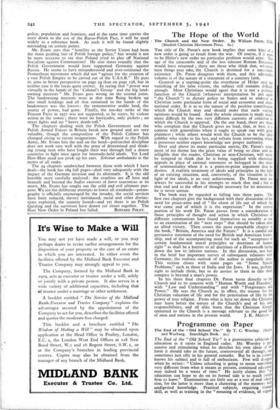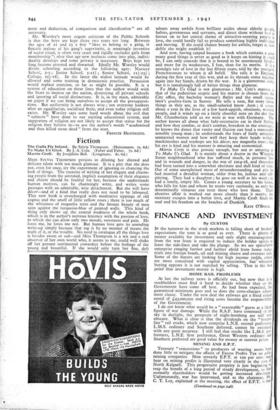Programme on Paper
The End of the Old School Tie." By T. C. Worsley. (seeker and Warburg. Searchlight Book. 2s.) The End of the Old School Tie." By T. C. Worsley. (seeker and Warburg. Searchlight Book. 2s.)
The End of the " Old School Tie" is a provocative criticism of education as it exists in England today. Mr. Worsley is per- suasive and stimulating when he sketches his own ideas of the form it should take in the future, controversial all through, and sometimes just silly in his general remarks. But he is in earnest, knows his subject and is full of enthusiasm. Few will disagree when he writes : " Unless schooling is going to mean somethiri very different from what it means at present, continued education may indeed be a waste of time." He justly claims that "all education can hope to do on its formal side is to teach peoPle how to learn." Examinations are little use as a test of real edua don, for the latter is more than a cluttering of the memory with, undigested knowledge. Practical subjects, requiring manual skill, as well as training in the " meaning of evidence„ of expeli'
ment and deduction, of comparison Sand classification " are all necessary.
Mr. Worsley's most cogent criticism of the Public Schools is that the boys are kept there two years too long. Between the ages of I I and 15 a boy " likes to belong to a gang, is fiercely jealous of his gang's superiority, is amazingly inventive of secret ritual, is often very cruel and rigidly excludes girls from membership "; after that age new instincts come into play, indivi- duality develops and some privacy is necessary. Boys kept too long become arrested and thwarted. Ideally Mr. Worsley would divide schooling according to the following ages : Nursery School, 2-5 ; Junior School, 5-114 ; Senior School, I14-154 '
•
College, 154-184. In the latter the widest latitude would be allowed and some training in democratic practice. Persuasion would replace coercion, so far as might be possible. It is a system of education on these lines that the author would wish the State to impose on the nation, destroying all private schools and ignoring all social distinctions. It is, in the main, admirable on paper if we can bring ourselves to accept all the presupposi- tions. But uniformity is not always wise ; not everyone hankers after an equalitarian, socialised State, and even today religion still exists. Mr. Worsley says some hard words about the evil that " subjects " have done to our existing educational system, and supporters of religion are not likely to accept that status for the religion they believe in—to use the author's words " academised and thus killed stone dead " from the start.
FRANCIS HEATHCOTE:



























 Previous page
Previous page